
Mouthwashing review – brilliantly refreshing and unflinching horror
A taut, time-hopping horror game that playfully subverts expectations at every step, and is all the more refreshing for it.
Mouthwashing begins with a series of contradictions. “I hope this hurts,” your mission log reads after listing the number of days your space freighter has spent hauling cargo across the cosmos for your bosses back at Pony Express. “Steer right,” you decide, after your ship’s computer tells you specifically to deviate left in order to avoid a collision with an unknown orbital body. Then it’s time to use the emergency key to override the cockpit console and disengage the autopilot, sealing your fate along with those of your four other crew members in the process.
You never have a say in any of these events – you must simply follow the instructions as the game presents them to you, even though every bone in your body (and the ship’s blaring red warning siren) is crying out for you to do the opposite. It’s unclear what’s led you to this point, but over the course of the next three hours, Mouthwashing will lay it all out in stark and unrelenting detail, jumping through time before and after this horrific accident-slash-act of sabotage to paint a complete and desperate picture of your crew’s descent into blinkered and unerring despair.
It’s certainly not the lightest way to spend an evening, but trust me when I say you’ll want to strap in for everything Mouthwashing has to throw at you regardless. For despite the futility of your remaining crew’s situation, Mouthwashing is a wildly inventive horror game that plays with the boundaries of time and space to exhilarating effect, and all with a gleeful glint in its large and unblinking eyeball. It’s not so much a scary game as one that simultaneously delights in pulling the rug out from beneath your feet while also extending an eager hand to haul you back up so you can see what’s coming next, leaving you utterly in thrall to its dark and absurdist humour as you’re whisked through time from one vignette to the next.
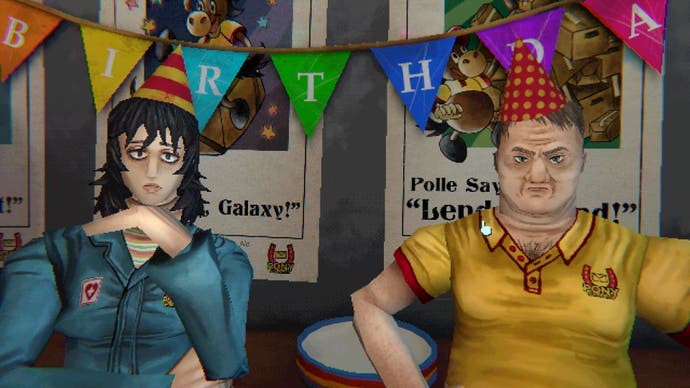
To say any more of its story would no doubt ruin many of the surprises that are best discovered for yourself. But as you ferry your crew between the days leading up to the crash, and the months spent desperately trying to survive afterwards, developer Wrong Organ makes wonderful use of its small and intimate setting. Your ship, the creaky and slightly dilapidated Tulpar, only ever consists of a handful of rooms and winding, scratched up corridors, but each of them proves surprisingly elastic in the before and after. As detritus builds up, tempers fray and everything starts to unravel, your route through them gets reconfigured, the focus of your next task shifting from room to room as others get blocked off or slammed shut after an argument. It’s remarkable how much it feels like an active working environment while also being a kind of houseshare in space, with certain crew mates always retreating to their designated offices when things get tense. And when some chapters last barely a minute, every lap you take through these rooms always manages to feel different from the last.
That’s partly down to its non-linear time-hopping, of course, and the clear visual distinctions between each jump make it easy to see at a glance exactly where you’ve landed on the sliding scale of ‘fine’ to ‘well and truly f*****’. As the colour palette drifts from cool and measured blues to manic, searing reds, sleeping bags become messier, food cans start to mount in the lounge, and yes, I think I know exactly what caused that enormous dent in the now flickering wall-to-ceiling TV screen there, too. As you might expect from such temporal trickery, knowledge you obtain in the past gains increasingly new significance in the present as you try and find a way forward, and as your understanding of the ship and its various tools grow, the more it begins to open up as its secrets bubble to the surface.
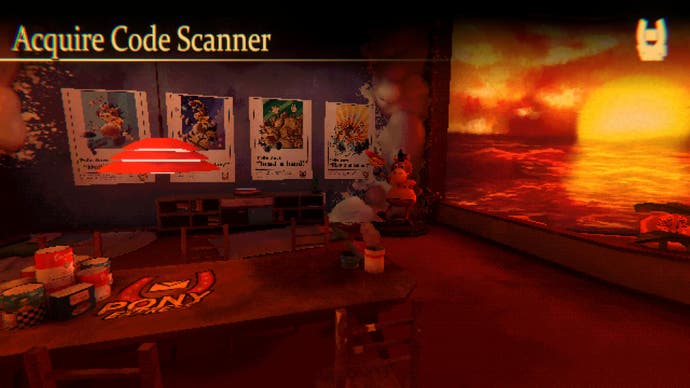
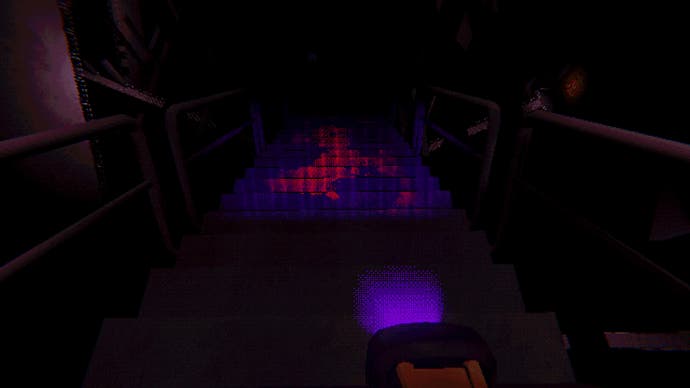
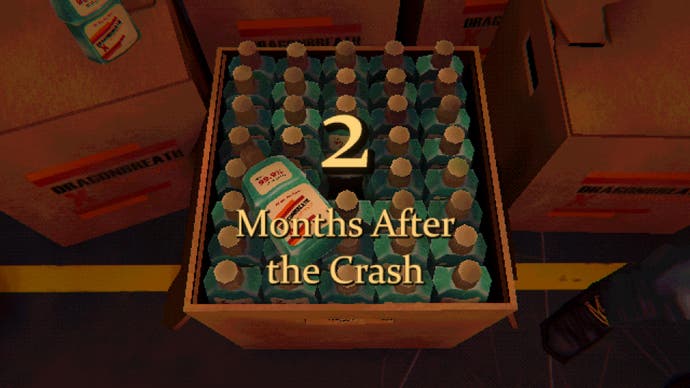
It’s very well done, but the thing Mouthwashing does best of all is how it remixes these spaces as potent reflections of your crew’s internal mindstates. In the run-up to the crash, for example, you take control of Captain Curly, who’s suspiciously eager to get through his imminent psych evaluation by repeating the same answers he gave for the last one. A little bit of a red flag, perhaps, but as he moves on to meet another crew member in the cockpit, he suddenly finds himself locked into going down a far too long staircase (which definitely wasn’t there the last time you made this journey), until he arrives at an endless, cosmic pool where abstract parts of the ship start erupting from its surface accompanied by blaring red warning panels. Such psychological disconnects are a surprisingly frequent occurrence in Mouthwashing, but the speed and ease at which they slide into view is brilliantly unnerving, seamlessly blending into your everyday activities like it was nothing at all.
It’s not just Curly who’s a little worse for wear. Later, as newly-appointed leader Jimmy, you’ll also have to navigate a surreal foray into the ship’s almost Tardis-like cargo hold, boxes stretching in every direction while an invisible, roaring beast rampages through a sea of ruffling cardboard. Your company’s mascot, Polee the anthropomorphic horse, also takes on almost Robbie the Rabbit levels creepiness, too, though without succumbing to the gore and squeamishness of Silent Hill more generally. Visually, these segments are always incredibly arresting, but their meaning is never so explicit that it gives the game away. You’re afforded the space to come to your own conclusions about their wider significance and meaning, and when many contain abstract flashforwards of things to come, it only hooks you in deeper to see it through to the end.
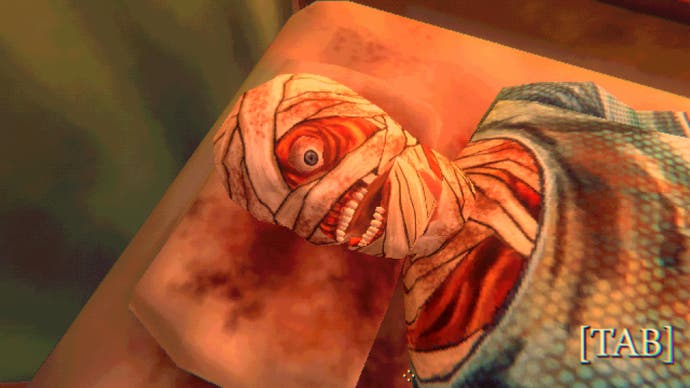
Mouthwashing also isn’t afraid to have a laugh at its own expense. Its chunky, PS1-era visuals give everything a wonderful dollhouse-like quality, from the big tactile buttons of the Tulpar’s consoles and code machines to the posable action figure-like bodies of your crewmates, as if the entire ship was just one big plaything to do with as you please. Nowhere is this more potent than the moments where, as new, post-crash captain Jimmy, you must lever open Curly’s now mummified jaw to pop in some painkillers, all while his glaring, comically large eye watches you from beneath his bandages. It’s a horrific, but bleakly funny kind of interaction, not least when you can stand there, opening and closing his jaw like some big toothy kitchen bin almost indefinitely.
It doubles down on this playful, but subtle sense of self-awareness later on, too, both in its climatic set pieces (of which I will say no more for fear of spoilers) and in the physicality of its controls. A barcode scanner that was once used to reveal codes and open locked doors becomes a tool to follow ghastly blood splatters, while the exaggerated, almost cartoonish saws of your analogue stick to cut a birthday cake get repurposed into something altogether grislier right toward the end. The actions themselves may be simple, but the way they’re recast in different lights only strengthens how thin the line is between past and present here, and what’s real and imagined. Similarly, the way each scene ends with an audio and visual stutter before the next one loads into view almost pixel by pixel only serves to underline that not everything is as it seems.
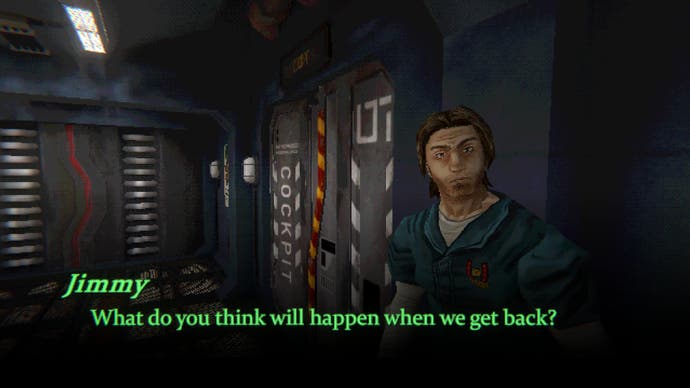
The crew members themselves tie it all together. They’re beautifully drawn creations, their foibles, worries and flaws all teased out gradually over time and to regularly devastating effect. Just when you think you’ve got the measure of the cantankerous Swansea, green and gullible Daisuke, Jimmy’s disgruntled sense of entitlement, nervous and anxious Anya, and the clearly not right Curly, its taut and confident plotting throws yet another curveball your way that sheds fresh light on everything that’s come before it. The more you play Mouthwashing, the more you can feel the foundations of what you know constantly shifting beneath your feet, and it’s always absolutely thrilling.
There are a couple of occasions where its snappy pacing comes a little undone, admittedly – though thankfully only two, due to some hazily-communicated stealth rules and instant-death restarts – but on the whole, Mouthwashing is a visceral tour-de-force from start to finish. It takes a long, hard look at how quickly (and gently) a human mind can unravel under pressure, and how corporate structures can both support and destroy those holding them up, giving meaning and purpose (however ridiculous) to those who’d struggle to survive outside them. It’s also not afraid to question what ‘taking responsibility’ really means, both from a personal point of view and more holistically. It’s a command you’re frequently tasked with as the game reaches its conclusion, but much like Mouthwashing’s opening, the ways in which you’re able to realise that objective probably aren’t going to be what you pictured originally. Its dizzying and delicious contradictions remain, and they feel downright refreshing.
Eurogamer sourced its own copy of Mouthwashing for this review.






